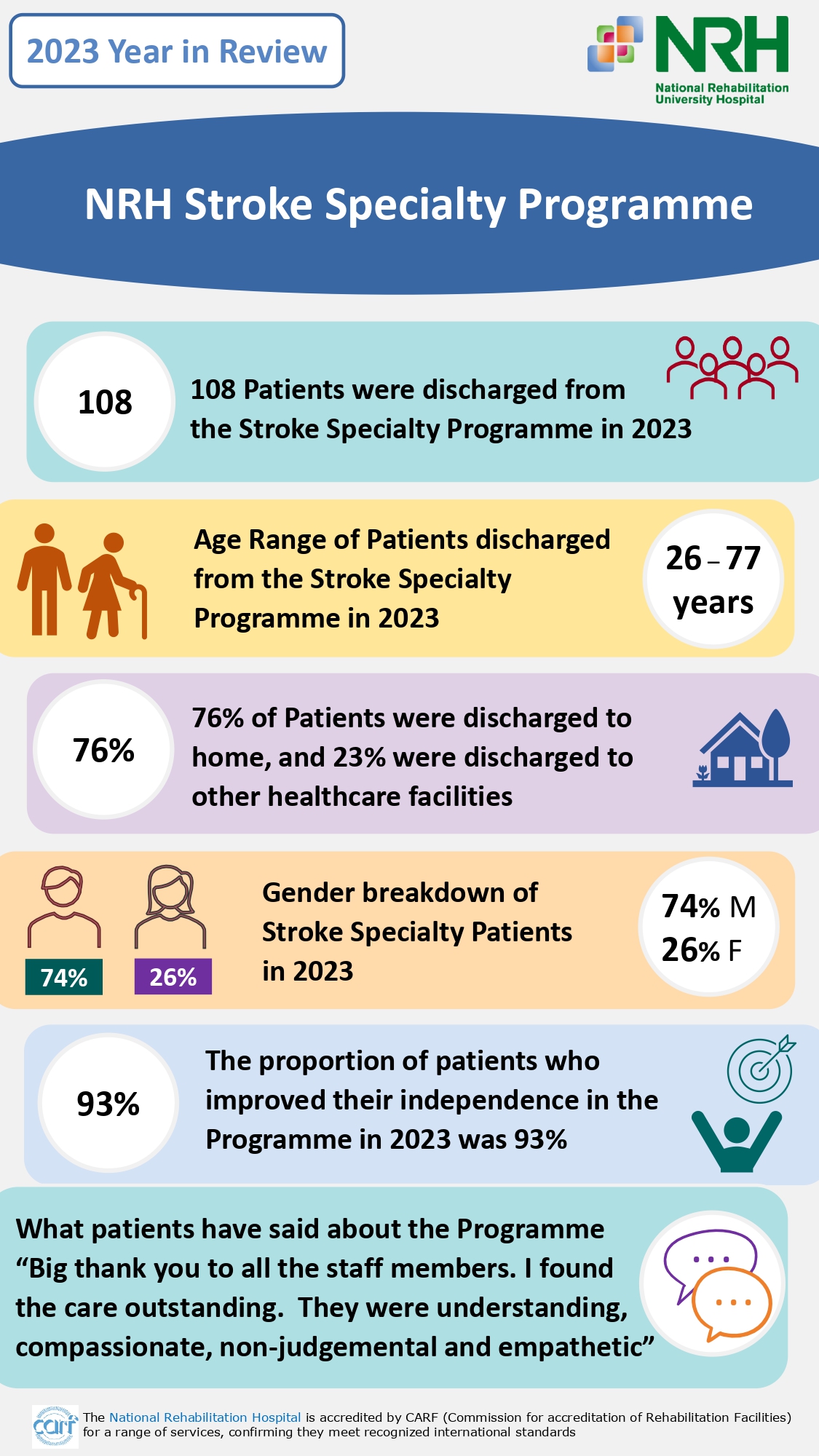The NRH Stroke Specialty Programme
The Stroke Specialty Programme at the National Rehabilitation Hospital, in collaboration with the patients, their families and carers, provides specialist stroke rehabilitation designed to lessen the impact of impairment and to assist people with stroke, to achieve optimum functional independence, social participation and community integration.
The Programme provides the national, and only, post-acute complex specialist inpatient rehabilitation service for people with stroke in the Republic of Ireland. Referrals are received nationwide from acute hospitals, HSE service areas and primary care.
The Stroke Specialty Programme is accredited by CARF (the Commission on the Accreditation of Rehabilitation Facilities) for inpatient, outpatient and home and community-based services.
Read more
The programme continues to deliver high quality, effective rehabilitation in a national context of increasing patient complexity and numbers, increasing demand for earlier access, and a higher proportion of all patients having higher complexity of needs than previously seen. Our interdisciplinary teams of experts continue to deliver consistent and excellent patient outcomes with reduction in resources.
Programme Goals and Achievements
Rehabilitation for patients with Stroke was previously delivered under the Brain Injury Programme, however, with advances in the performance management system for the NRH, the Stroke Specialty Programme was established and is now delivered separately from the Brain Injury Programme.
Person-centred coordinated care
Stratifying Stroke as distinct from other acquired brain injury and illness has enabled the programme to view, analyse and report data in a more person-centred coordinated way. New targets have been set for operational and functional outcomes and we have the country’s only specialist inpatient stroke rehabilitation facility.
Enabling integrated care
Stroke is a leading cause of death and disability worldwide and in Ireland, approximately 10,000 people will have a stroke event each year. According to the recently published Irish Heart Foundation National Stroke Audit just one in four patients were recorded as having received acute or post-acute rehabilitation. Increasing demands on healthcare services has led the Health Service Executive (HSE) in Ireland to consider the role of the patients in managing their own healthcare, with an emphasis on chronic disease self-management programmes and the development of a national framework for supported self-management.
These initiatives have guided the development and design of the NRH Stroke Specialty Programme and aim to make better use of consultations with professionals and for patients to take a greater role in managing their own health condition.
Show less
Rehabilitation Team in the Stroke Specialty Programme
Read more
Patient care and treatment for the Stroke Specialty Programme is delivered by interdisciplinary teams (Medical, Nursing, Health and Social Care Professionals), with clinical responsibility led by Dr Kinley Roberts, Medical Director for the Stroke Specialty Programme.
In addition, Consultants in Rehabilitation Medicine who provide a service to these Programmes include:
- Prof. Jacinta Morgan
- Dr. Jacinta McElligott
- Dr. Paul Carroll
- Dr. Eugene Wallace
- Dr. John McFarlane
Kate Curtin is the Programme Manager for the Stroke Specialty Programme
At the NRH, the Brain Injury and Stroke Specialty services access the full complement of support from:
- Medical
- Nursing and clinical support
- Therapy services
- Patient Services (administration)
Input is also required from Neuropsychiatry, Gastroenterology, Endocrinology, Ophthalmology, and ENT.
Show less
Demographics, Activity and Outcomes for Inpatient Services
Read more
In 2023, a total of 108 persons were discharged from the Stroke Specialty Inpatient Programme.
Of these, 106 patients were admitted to the Comprehensive Integrated Inpatient Rehabilitation Programme (CIIRP), and 2 patients were admitted for a short period of assessment or review.
Of the 106 patients discharged from the CIIRP Programme;
- 21 patients – (20%) had a diagnosis of Haemorrhagic Stroke
- 76 patients – (72%) had a diagnosis of Ischaemic Stroke
- 09 patients – (8%) had a diagnosis of other Stroke
The NRH has committed to a programme of continual review of its service delivery. Following on from reviews, it implements various improvement plans.
During 2023, the areas considered were:
Average Waiting Time for Admission
The average waiting time for admission to the Stroke Programme was 166 days.
Improvement Patients made in their Functional Ability during their stay
For patients admitted to the Stroke Programme, a measure of independence is taken at both admission and discharge. The measures used in the Stroke Programme are the Modified Barthel and the Functional Independence Measure (FIM).
The Functional Independence Measure illustrated that 93% of patients showed improvement and the Modified Barthel illustrated that 79% of patients showed improvement.
Average Length of Stay
The Average length of stay for patients in the Stroke Programme was 92 days.
Discharge to Home*
76% of patients were discharged to home.
* Rather than back to Acute hospital or residential care
Show less


